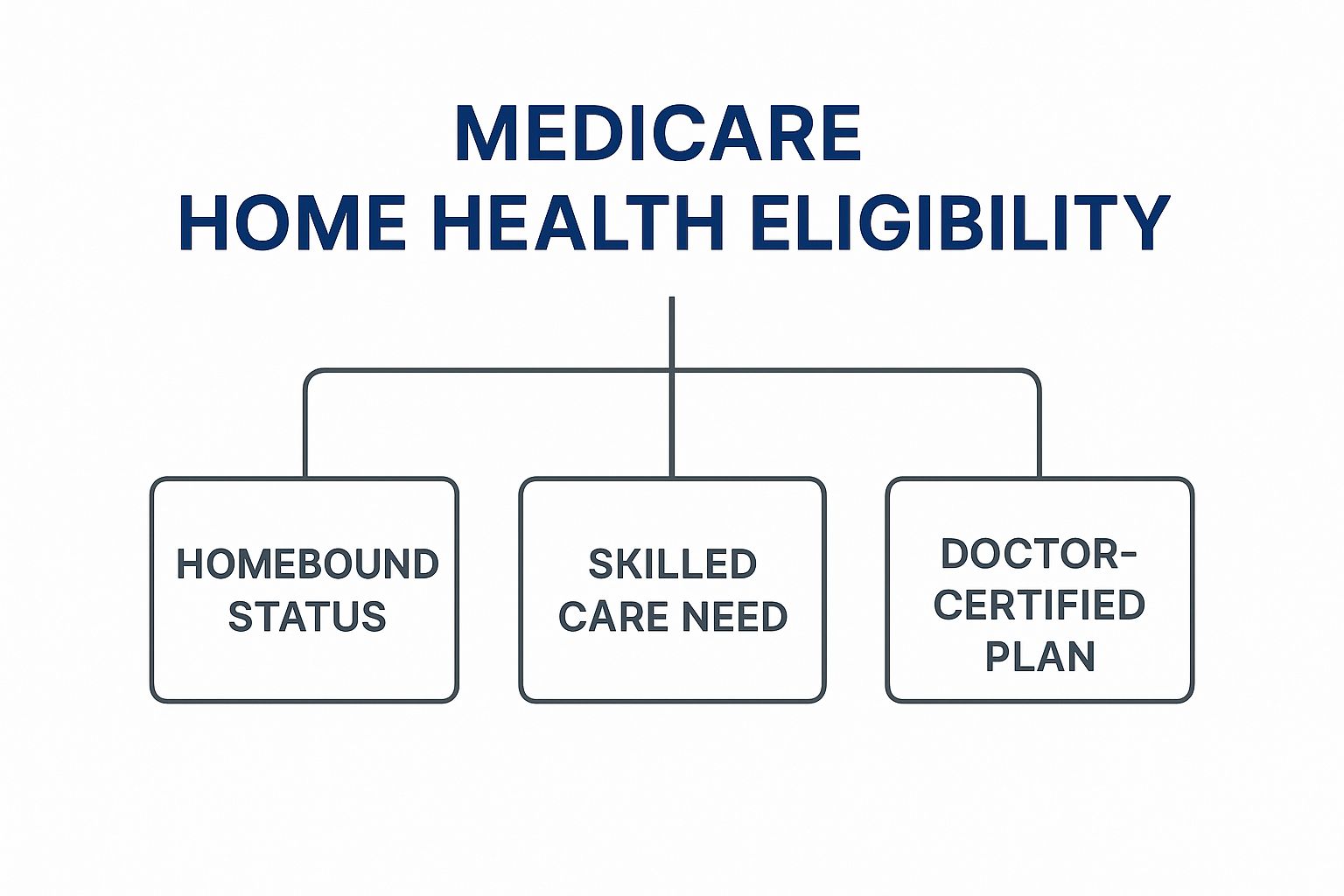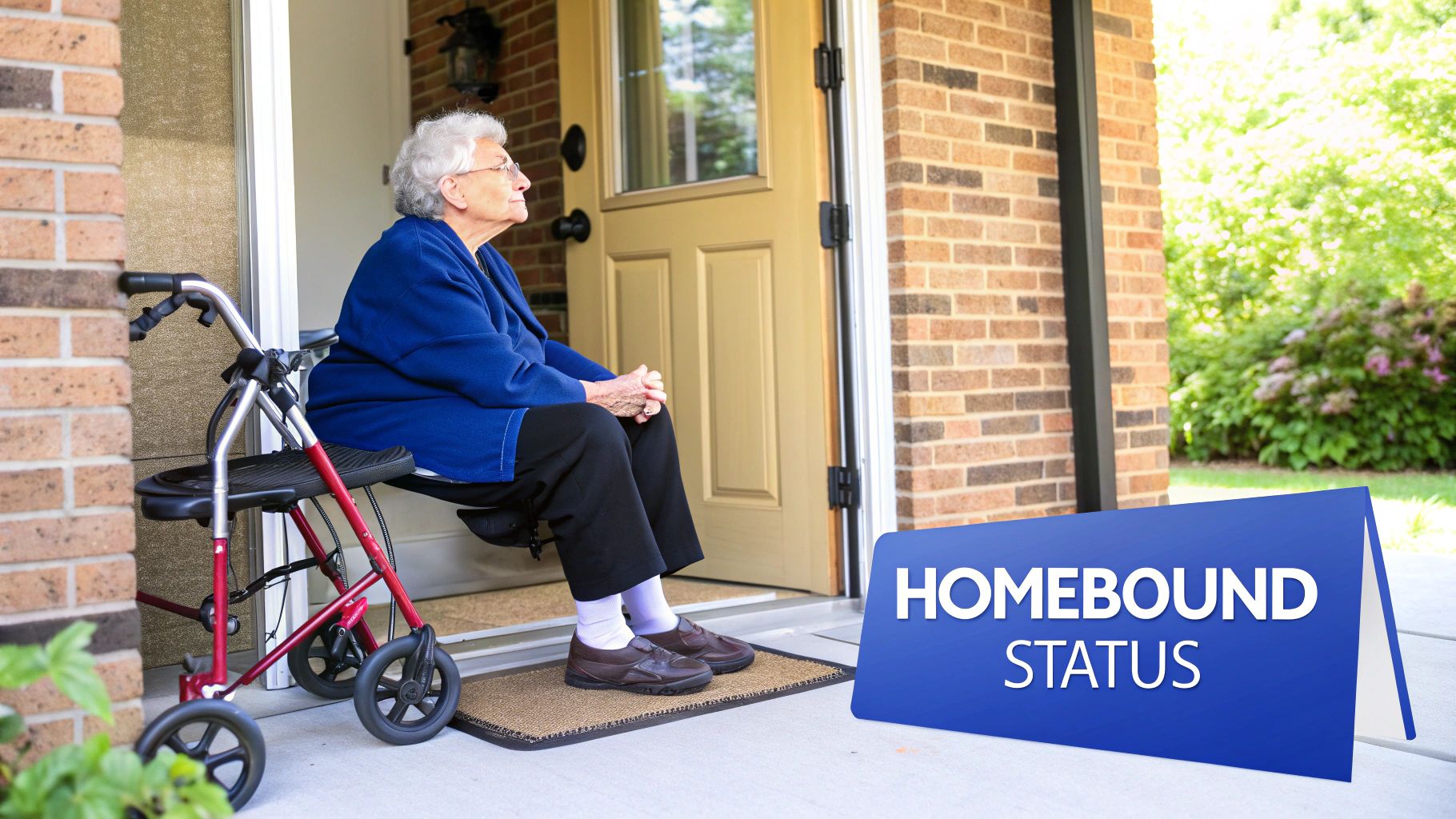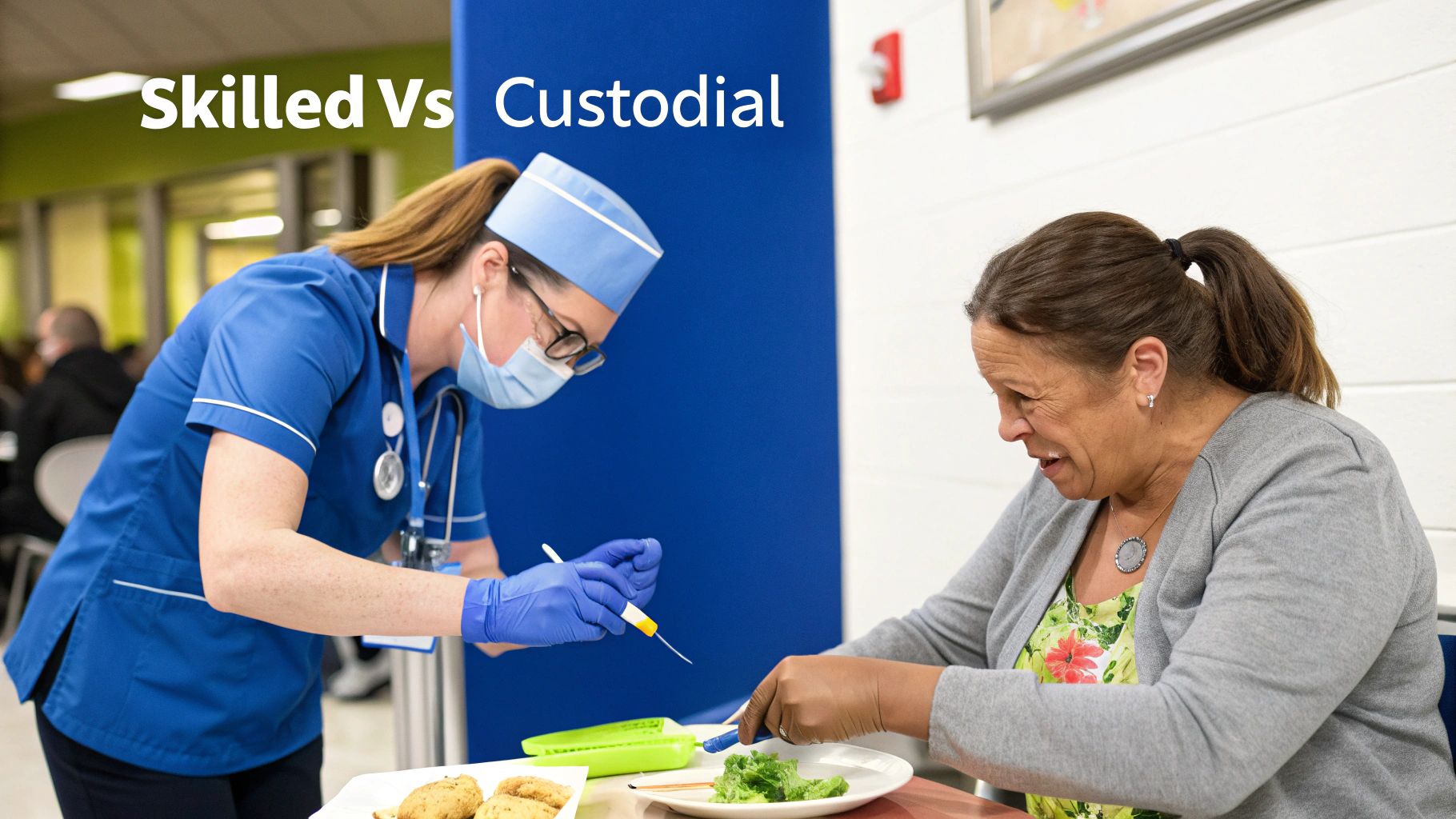To get the green light for Medicare home health care, a few key pieces have to fall into place. Think of it like a three-legged stool: you need to be under a doctor's care, require skilled nursing or therapy, and be certified as homebound. If one leg is missing, the whole thing topples. It's Medicare's way of ensuring these benefits go to those with a true medical need for care at home.
Breaking Down Medicare Home Health Requirements
Figuring out Medicare's rules can sometimes feel like learning a new language, but it really comes down to a clear set of medical and practical criteria. This isn't about convenience; it's about a documented, medical necessity for receiving care right where you live. At its core, Medicare home health is designed to provide short-term, skilled support to help you get back on your feet after an illness, injury, or surgery.
This infographic breaks down the three core pillars of eligibility perfectly.

As you can see, it’s a three-part puzzle. You can’t qualify without being homebound, needing skilled care, and having a doctor's plan—all three are equally critical.
The Three Pillars of Eligibility
Let's dig into what each of these requirements actually means for you and your family. Meeting these standards is the first step toward getting the support you need.
-
You Must Be Under a Doctor's Care: This goes beyond a simple recommendation. A physician has to create and regularly review a formal plan of care specifically for you. It's a documented strategy that outlines your medical needs and the exact services required to meet them.
-
You Must Need Skilled Care: Your condition has to require intermittent skilled nursing care, physical therapy, speech-language pathology, or ongoing occupational therapy. This is a crucial distinction from personal or custodial care, which involves help with daily activities like bathing or dressing. You can learn more about the specific Medicare home health benefits covered under this requirement in our detailed guide.
-
You Must Be Homebound: This one is often the most misunderstood. Being certified as homebound is absolutely central to qualifying. It's a two-part test: you must either need assistance (from another person or a device like a walker) to leave home, and leaving home must take a considerable and taxing effort.
To help simplify these requirements, here's a quick summary table.
Medicare Home Health Eligibility At a Glance
| Requirement Category | What It Means for You |
|---|---|
| Under a Doctor's Care | A doctor must create, certify, and regularly review your plan of care. |
| Need for Skilled Care | You require part-time skilled nursing or therapy (PT, OT, SLP). |
| Certified Homebound | It's difficult and taxing for you to leave home, requiring assistance. |
Ultimately, ticking all three of these boxes is what opens the door to Medicare-covered home health services.
At NJ Caregiving, we help families in Princeton and Mercer County navigate these requirements every day. We're here to make sure they have the right documentation in place to secure the benefits they deserve.
What Being "Homebound" Really Means for You

Out of all the Medicare requirements for home health care, the term "homebound" is easily the most misunderstood. It’s a word that makes most people think of someone who is completely bedridden or physically unable to step a foot outside their door.
But that’s not quite how Medicare sees it. Their definition is more flexible and focuses on the effort involved in leaving home, not just whether you can technically do it. Getting this distinction right is the key to qualifying for care. It’s not about being a prisoner in your own home; it's about whether leaving requires a huge, draining effort.
The Two-Part Test for Homebound Status
To figure out if you meet the criteria, Medicare uses a simple two-part test. A doctor has to certify that you meet both conditions. Think of it like needing two separate keys to unlock a door—having just one won't work.
Condition 1: You Need Help to Leave Home
First, you must need assistance from another person or a medical device to get out of the house. This can also apply if your doctor advises against leaving home because of your medical condition.
- Help from a Device: This means you rely on a walker, wheelchair, crutches, or even a cane to get around safely outside.
- Help from a Person: This is when you need someone's physical help to walk, get into a car, or manage stairs.
- Doctor's Orders: In some cases, your doctor might determine that leaving home is a risk to your health. This could be due to severe shortness of breath from COPD or a compromised immune system that makes you vulnerable to illness.
Condition 2: Leaving Home Is a Major Ordeal
Second, it must be a "considerable and taxing effort" for you to leave your home. This part is less about black-and-white rules and more about the physical and even emotional toll an outing takes on you.
Even if you can technically get out the door, does the process leave you completely wiped out for the rest of the day? That’s a huge part of the assessment.
For example, someone with severe arthritis might be able to get to the car with a walker and some help. But the pain and exhaustion from that single trip make it a monumental task they can only handle once in a blue moon. This is a perfect example of what Medicare considers a "taxing effort."
What About Leaving the House for Appointments?
Being homebound doesn't mean you're under house arrest. Medicare understands that you still need to get out for important things, and these occasional trips won't disqualify you.
Permitted absences usually include:
- Medical Care: Going to the doctor, a physical therapist, or for outpatient treatments is always okay.
- Religious Services: Attending church, a synagogue, or other places of worship is allowed.
- Adult Day Care: Trips to a licensed adult day care center are also fine.
- Special Occasions: Infrequent outings for a special family event, like a grandchild’s graduation or a holiday dinner, are generally permitted.
The key here is that these trips have to be infrequent and for a short duration. Driving yourself to the grocery store every other day or attending weekly social club meetings would likely signal to Medicare that you aren’t truly homebound.
Ultimately, your condition needs to limit your ability to handle certain activities of daily living to the point where leaving home is a genuine challenge. The single most important step is having a frank conversation with your doctor about just how much effort it takes for you to get out of the house. That's what they'll use to make an accurate certification.
Skilled Care vs. Custodial Care: What's the Difference?

So, you’ve met the "homebound" requirement. The next hurdle—and it’s a big one—is understanding the need for skilled care. This is where many families get tripped up, because Medicare draws a very clear line in the sand between two types of support: skilled care and custodial care.
Getting this right is crucial. Medicare covers skilled care, but it generally does not cover custodial care on its own.
Think of it this way: skilled care is like calling in a master electrician to rewire your house after a major issue. It requires specific training, licenses, and expertise. Custodial care, on the other hand, is more like routine house cleaning—essential for upkeep, but not a technical repair job.
What Is Skilled Care?
In Medicare’s eyes, skilled care refers to medical services that can only be performed safely and correctly by a licensed health professional, like a registered nurse or physical therapist. These aren't tasks an untrained family member or aide can handle.
This care must be ordered by your doctor and be a formal part of your recovery plan. Its whole purpose is to treat an illness or injury, helping you get back on your feet and regain independence.
A few clear examples of skilled care include:
- Wound Care: Managing complex wounds, like pressure sores or post-surgical incisions, that require sterile dressing changes.
- Physical Therapy: Leading rehabilitation exercises to help you restore movement and function after a stroke, fall, or surgery.
- Speech-Language Pathology: Working with you to regain communication skills after a medical event.
- Injections and IV Drugs: Administering medications that require a licensed professional for safety and accuracy.
The bottom line for skilled care is medical necessity. The service has to be a reasonable and required treatment for your specific condition, not just for general daily support.
What Is Custodial Care?
Custodial care is all about providing help with activities of daily living (ADLs). It’s the hands-on, non-medical assistance that helps someone navigate their day safely. While this support is incredibly important for quality of life, Medicare doesn't consider it a skilled service.
This distinction is make-or-break. If you only need help with personal tasks, Medicare home health benefits won't kick in.
Examples of custodial care include assistance with:
- Bathing and dressing
- Preparing meals and eating
- Housekeeping and laundry
- Using the bathroom and moving from a bed to a chair
Needing this kind of help alone won't qualify you. However, there’s an important exception: if you do qualify for skilled nursing or therapy, Medicare may also cover a home health aide to provide these custodial services on a part-time basis.
For a closer look at what professional nursing support involves, you can learn more about what skilled nursing care is and see how it fits into a comprehensive care plan.
How a Doctor Establishes Your Plan of Care

Think of your doctor as the architect of your home health care journey. Before any services can even start, Medicare needs a formal blueprint—this is what’s known as the plan of care. This isn't just a simple prescription. It’s a detailed, physician-certified strategy that lays out every single aspect of your treatment at home.
This plan is the official justification for your services. It proves to Medicare that your care is medically necessary and properly structured. It also ensures that the home health agency, your doctor, and you are all on the same page, working toward the same health goals. That makes it one of the most critical pieces of the Medicare home health requirements.
The Face-to-Face Encounter
Everything kicks off with a mandatory face-to-face encounter with a physician. This isn't optional. This meeting has to happen either within the 90 days before you start home health care or within 30 days after your care begins.
This visit is much more than a routine check-up. Its main purpose is for the doctor to assess the specific condition that makes home health services necessary. They'll document exactly why you're considered homebound and why you require skilled care, building the foundation for your entire plan.
Your plan of care is a living document. Your physician must review and recertify it at least once every 60 days to confirm the care you're receiving is still needed and working for your condition.
Key Components of a Strong Plan
A plan of care that meets Medicare's standards has to be specific and thorough. It's the roadmap for the home health agency, so there can't be any gray areas.
Here are the essential elements it must include:
- Your Diagnoses: All the relevant medical conditions that justify why you need care.
- Types of Services: A clear rundown of the skilled services required, like skilled nursing, physical therapy, or speech therapy.
- Frequency and Duration: How often and for how long each service is needed (for example, "physical therapy three times per week for four weeks").
- Your Treatment Goals: Specific, measurable targets for your recovery and health improvement.
- Medical Equipment: Any durable medical equipment you might need, such as a hospital bed or a walker.
- Medication Details: A complete and current list of all your medications.
This level of detail helps agencies provide consistent, high-quality care. Recognizing its importance, the Centers for Medicare & Medicaid Services recently boosted Medicare payments to home health agencies by 0.5% for 2025—an increase of about $85 million. You can dig into the details in the 2025 Home Health PPS final rule to see how funding supports these crucial services.
Bottom line? Without this doctor-certified plan, Medicare coverage simply isn't an option.
Navigating the Approval and Documentation Process
Once your doctor gives you the green light on meeting Medicare's home health requirements, the next big step is getting all your paperwork in order. This isn't just a formality—it's the evidence Medicare needs to see before they approve your care.
Think of it like building a case for a jury. Every single document is a piece of proof that shows you have a genuine medical need for skilled services at home. Even a tiny mistake, like a missing signature or an incomplete care plan, can cause frustrating delays or even an outright denial. Getting it right comes down to sweating the small stuff.
Common Pitfalls That Lead to Denials
Unfortunately, simple clerical errors are one of the biggest reasons claims get turned down. The system is massive; in 2023, Medicare paid out roughly $16 billion for home health services covering about 2.8 million people.
But that same year, the program also flagged a 7.7% improper payment rate for home health claims, which shows just how often documentation problems pop up. You can dig into the details in these Medicare compliance findings from the OIG.
To steer clear of these issues, it helps to know what the most common mistakes are:
- Vague Plan of Care: The plan doesn't spell out exactly how often or for how long services are needed.
- Missing Signature: The doctor’s certification isn't signed and dated properly.
- Weak Medical Records: The paperwork just doesn't do a good job of proving why the patient is homebound or needs skilled care.
A strong application tells a clear, consistent story. Your doctor's notes, the plan of care, and the home health agency's assessments should all line up, painting a unified picture of your medical needs.
Your Essential Documentation Checklist
Wrangling paperwork feels a lot less daunting when you know exactly what’s needed. Your chosen home health agency, like NJ Caregiving, will handle the heavy lifting, but understanding the key documents can empower you and your family through the process.
Here’s a quick rundown of what Medicare needs to see:
- Physician Certification and Plan of Care: This is the cornerstone document. It's signed by your doctor and confirms you're homebound, need skilled care, and lays out your entire treatment plan.
- Face-to-Face Encounter Notes: These are the detailed notes from your doctor's visit that explain the primary reason you need home health services in the first place.
- Comprehensive Patient Assessment: This is an initial evaluation done by the home health agency (usually a registered nurse) to get a clear picture of your condition and needs right in your own home.
- Ongoing Progress Notes: Think of these as regular updates from your nurses and therapists. They track how you're doing and show your progress toward the goals in your care plan.
- Recertification Documents: Your need for care isn't a one-and-done approval. Your doctor has to review your case and recertify your need for care at least every 60 days.
Making sure all these pieces are in place and correctly filled out is the key to a strong, compliant application and a smooth approval.
Finding the Right Medicare-Certified Home Health Agency
Alright, you've confirmed you meet the core requirements for Medicare home health care. Now comes the most important part: picking the right team to bring that care into your home. This isn't just about finding any provider; it has to be a Medicare-certified home health agency.
That certification is a non-negotiable. It's the only way Medicare will foot the bill for your services.
Think of Medicare certification as a seal of approval from the federal government. It's a guarantee that an agency meets strict standards for patient health and safety. These organizations are regularly inspected and held to high benchmarks for everything—from the qualifications of their nurses and therapists to patient rights and the quality of care they deliver. Choosing a certified agency means you're getting care that’s not just covered, but also professional and trustworthy.
How to Research Agencies with Medicare's Care Compare Tool
The good news is you don't have to make this decision flying blind. Medicare gives you a fantastic, unbiased tool to find and vet agencies right in your neighborhood.
The official Care Compare tool on the Medicare website is your best friend here. It gives you a transparent, data-backed look at how different agencies stack up. You can use it to:
- Find Local Providers: Just punch in your zip code, and it’ll show you a list of certified agencies that serve your area.
- Check Quality Scores: See how agencies perform on crucial measures, like how often their patients get better at walking or how well they help manage pain.
- Read Patient Surveys: Get the real story from actual patients. You can read their feedback on everything from how well the staff communicated to their overall satisfaction.
Using the Care Compare tool helps you look past the glossy brochures and make a decision based on real-world results. It's all about finding an agency that not only meets Medicare’s standards but also has a proven track record of great patient outcomes.
The Value of a True Agency Partner
A great home health agency does so much more than just send a nurse to your door. They should be a true partner, guiding you and your family through what can be a confusing process.
Here at NJ Caregiving, for example, our team coordinates directly with your doctor. We make sure every piece of paperwork is handled perfectly, from the initial plan of care to the required 60-day recertifications. This hands-on approach is key to preventing delays or gaps in your coverage, so you can put all your energy where it belongs: on getting better.
Common Questions About Medicare Home Health Care
Even once you get the hang of the basic rules, the world of Medicare home health care can still feel a bit tricky. Let's walk through some of the most common questions that pop up for families, answering them directly so you can feel more confident about the journey ahead.
These are the real-world, day-to-day concerns that often surface long after the initial approval is sorted out.
How Long Does Coverage Last?
This is easily one of the most frequent questions we hear. The short answer is that Medicare doesn't put a strict time limit on how long you can receive home health services. Instead, it all comes down to your ongoing medical need.
Care is structured in 60-day periods, often called "episodes of care." Before each 60-day window closes, your doctor has to review your situation and formally recertify that you still meet all the criteria—that you're still homebound and still require skilled care. As long as your doctor confirms the need, your benefits can be renewed for another 60 days.
What if My Condition Improves?
This is the best-case scenario! The whole point of home health care is to help you get better. If your health improves to the point where you no longer need skilled nursing or therapy, or you can leave the house without it being a major effort, your Medicare-covered services will come to a close.
But they won't just leave you high and dry. The home health agency will work hand-in-hand with you and your doctor to map out a safe discharge plan. This makes sure you have all the resources and support you need to keep managing your health on your own.
It's helpful to think of Medicare home health care as a short-term, restorative benefit—not a permanent long-term care solution.
Are Medical Supplies and Equipment Covered?
Yes, but they fall into two different buckets. Medical supplies that are a core part of your care—things like wound dressings or catheters—are covered by Medicare Part A as part of the home health benefit. You won't pay anything out of pocket for these.
Durable medical equipment (DME) is a different story. This includes items like walkers, hospital beds, or oxygen equipment. DME is covered under Medicare Part B. That means you'll typically be responsible for 20% of the Medicare-approved amount after you've met your annual Part B deductible.
Do Medicare Advantage Plans Have Different Rules?
They absolutely do. While Medicare Advantage (Part C) plans are legally required to offer the same benefits as Original Medicare, they run their own playbook. With a Part C plan, you'll almost certainly have to:
- Use an in-network agency that has a contract with your specific plan.
- Get prior authorization before your services can even start.
- Pay different copayments or coinsurance based on your plan’s unique structure.
Your best bet is to always call your Medicare Advantage plan provider directly. They can give you the exact rundown of their rules and procedures for home health care.
Trying to make sense of these rules can feel like a full-time job, but you don't have to figure it all out alone. NJ Caregiving specializes in guiding families in Princeton and Mercer County through this process, making sure you understand your benefits and get the incredible care you deserve. Learn more about how we can help your family.


